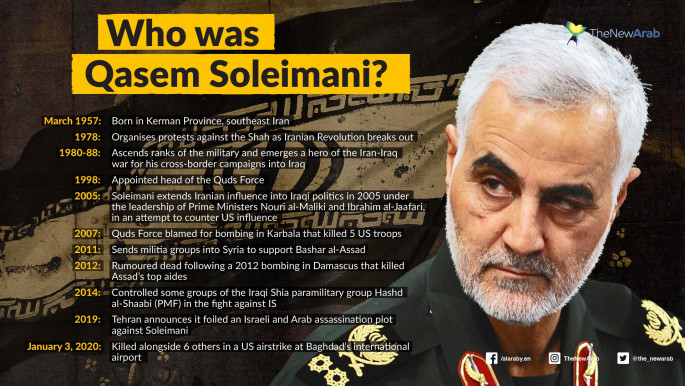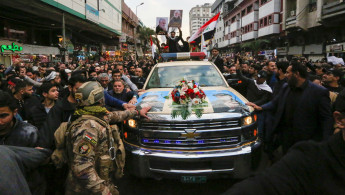Iraq PM joins thousands mourning slain Iranian, Iraqi commanders
Adel Abdel Mahdi joined Muhandis associate Hadi al-Ameri, Shia cleric Ammar al-Hakim, former premier Nouri al-Maliki and other pro-Iran figures in a crowd of thousands.
The coffins were first brought to a revered Shia shrine in Baghdad's Kadhimiya district, where thousands of mourners chanted "Death to America".
Dressed in black, they waved white Hashed flags and massive portraits of Iranian and Iraqi leaders, furiously calling for "revenge".
The crowds then accompanied them south to a point near the Green Zone, home to government offices and foreign embassies, including America's.
The dignitaries then accompanied the coffins into the Green Zone for an official ceremony.
Soleimani and Muhandis were killed along with eight others in a precision drone strike early on Friday as they drove away from Baghdad international airport in two vehicles.
Read more: Who was Qasem Soleimani, the powerful commander of Iran's elite Quds force?
Soleimani was the head of the Iranian Revolutionary Guards' foreign operations arm while Muhandis was the deputy head of Iraq's Hashd al-Shaabi paramilitary network.
The remains will later be taken to the Shia holy city of Najaf to the south, and the remains of the Guards will then be flown to Iran, which has declared three days of mourning.
Tehran has already named Soleimani's deputy, Esmail Qaani, to replace him.
His first order of business was made clear on Friday when Iran's supreme leader Ayatollah Ali Khamenei promised "severe revenge" for Soleimani's death.
Early on Friday, a volley of missiles hit Baghdad's international airport, striking a convoy belonging to the Hashd al-Shaabi, an Iraqi paramilitary force with close ties to Iran.
Just a few hours later, Iran's Revolutionary Guard Corps announced Soleimani "was martyred in an attack by America on Baghdad airport this morning".
The Hashd confirmed both Soleimani and its deputy chief Abu Mahdi al-Muhandis were killed in what it said was a "US strike that targeted their car on the Baghdad International Airport road".
The Pentagon said US President Donald Trump had ordered Soleimani's "killing" after a pro-Iran mob this week laid siege to the US embassy in the Iraqi capital.
The Iraqi prime minister said the strike was a "flagrant violation" of a security accord with the US, warning it would "spark a devastating war in Iraq".
Read more: Comment: Soleimani assassination spells trouble for Iraqis, Iranians and the region
A paramilitary group, Asaib Ahl al-Haq, urged its fighters to be on high alert, while in Lebanon, the leader of Iran-backed Hezbollah, Hassan Nasrallah, warned of "punishment for these criminal assassins".
The developments come after an unprecedented attack on the US mission in Baghdad.
A mob of Hashd al-Shaabi supporters surrounded the US embassy on Tuesday, angered by American airstrikes that killed 25 fighters from the network's hardline Kataeb Hezbollah faction, which is backed by Iran.
The US had acted in response to a rocket attack days earlier that had killed an American contractor working in Iraq.
Iran has declared it will seek to avenge the killing of Soleimani, widely considered among the most powerful figures in the Islamic Republic, second only to the supreme leader Ayatollah Khamenei.
"President Trump just tossed a stick of dynamite into a tinderbox," former vice president Joe Biden said in a statement.
"Iran will surely respond. We could be on the brink of a major conflict across the Middle East."
 |
Meanwhile, the UN is on the brink of re-issuing sanctions on Iran, as Tehran pushes ahead with uranium enrichment, in breach of the limits on its nuclear programme imposed by the 2015 nuclear deal.
President Trump unilaterally withdrew from the deal brokered by his predecessor Barack Obama, reimposing harsh sanctions on Iran and sparking renewed tensions which have mounted until now.





 Follow the Middle East's top stories in English at The New Arab on Google News
Follow the Middle East's top stories in English at The New Arab on Google News
![The UAE is widely suspected of arming the RSF militia [Getty]](/sites/default/files/styles/image_330x185/public/2024-11/GettyImages-472529908.jpg?h=69f2b9d0&itok=Yauw3YTG)
![Netanyahu furiously denounced the ICC [Getty]](/sites/default/files/styles/image_330x185/public/2024-11/GettyImages-2169352575.jpg?h=199d8c1f&itok=-vRiruf5)
![Both Hamas and the Palestinian Authority welcomed the ICC arrest warrants [Getty]](/sites/default/files/styles/image_330x185/public/2024-11/GettyImages-2178351173.jpg?h=199d8c1f&itok=TV858iVg)